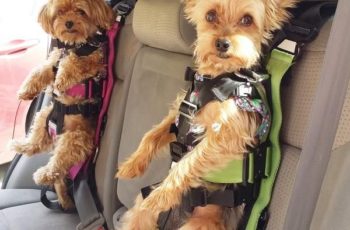Pitbulls are an amazing and often misunderstood dog breed. After all, most of the time the Pitbull’s rough exterior is hiding a total sweetheart on the inside. Just like most other dog breeds though, Pitbull puppies have the tendency to bite inappropriately.
Most of the time biting in Pitbull puppies occurs during play. This is because biting is a natural behavior for dogs when they are playing. However, play biting can quickly get out of hand, especially if your dog has not properly learned that biting can hurt people.
Here we will be explaining how you can train your Pitbull puppy not to bite. We will be providing you with several different training methods, all of which will cover all of the most common causes of biting in puppies.
Additionally, I will also be addressing some other common issues associated with Pitbull puppies and biting.
Let’s dive right in!!
Why do Pitbull Puppies Bite?
Most of the time biting in Pitbull puppies occurs during play. However, sometimes aggression could cause a puppy to nip or bite.
Here we will be explaining why dogs bite in certain situations.
Cause 1: They’re Playing
Biting is a natural behavior during play in dogs. Most of the time this will be in the form of gentle mouthing. However, just because a Pitbull puppy is biting roughly during play doesn’t necessarily mean that their intentions are aggressive.
This is because puppies will learn something called bite inhibition when they’re still very young and playing with their littermates. Puppies at this young age learn that a bite harms one of their littermates when they squeal or whine.
While the above example is definitely ideal when it comes to puppy rearing, this is not always what occurs at the beginning of a Pitbull puppy’s life.
Puppies are sometimes separated from their mother and littermates much too early for a multitude of reasons. Most of the time Pitbull puppies that have been adopted from shelters or rescues have been separated early on in an effort to give that puppy a better life than they would have had.
The result of this early separation between a puppy and their littermates is a puppy that does not have very good bite inhibition. Unfortunately, this also means that their play-biting may be much too rough for many people. Luckily, this issue can be resolved fairly easily with the right training.
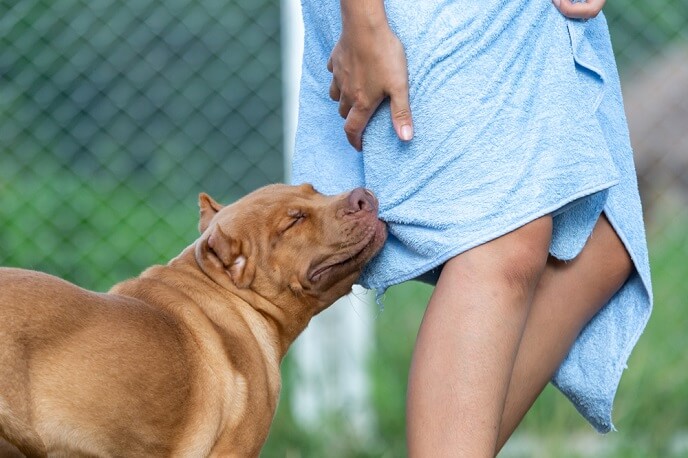
Cause 2: They’re Guarding Their Resources
Sometimes puppies and adult dogs will also bite because they are guarding things that are very important to them. Most of the time these important resources include food, treats, and toys. However, resource guarding in dogs can also extend to guarding things like water and specific people or animals.
Resource guarding occurs when a dog feels as if they need to fight or compete for important things like food, water, and comfort in the past. This can happen due to competition with other dogs for resources, or simply because humans are often taking things away from them.
Most of the time resource guarding in dogs includes more signs than just biting. Growling, snarling, barking, and snapping are all possible behaviors that could accompany biting in a dog that is resource guarding.
Considering that resource guarding could potentially become dangerous, I always recommend that owners swiftly work to get this issue resolved.
Cause 3: They’re Feeling Threatened
Puppies may also lash out and bite when they feel threatened by someone or something. This behavior is usually coming from a place of fear or anxiety, and it is essentially a way of saying “stay away from me”!
Most of the time defensively aggressive behavior in dogs occurs when they have not been properly socialized with people or other animals. However, sometimes being mistreated in the past could also cause this kind of behavior in puppies as well.
Cause 4: Playing Has Gotten Out of Hand
Sadly, aggression towards other dogs can occur more frequently in Pitbulls and Pitbull mixes than it can in some other breeds. This means that biting can sometimes turn into aggressive behavior when some Pitbull puppies are playing with other dogs.
While this behavior is innate for some dogs, it can quickly become an incredibly dangerous situation. As a result, it’s a good idea to reach out to a professional such as a qualified dog trainer or animal behaviorist in order to get this problem resolved.
When Does Puppy Biting and Playful Mouthing Become a Problem?
The only time when play biting really becomes a problem is when it hurts you or others, especially if the puppy’s bite has drawn blood or left a bruise.
Although puppies are usually not meaning to hurt us when they play bite, overly rough play biting is a sign that your puppy will need some extra training in this area.
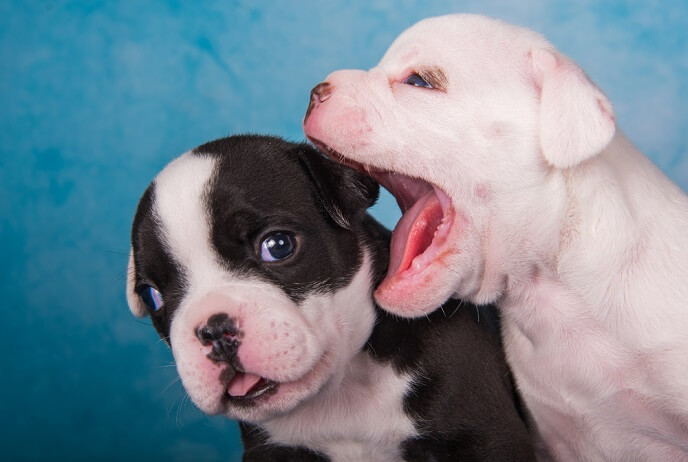
How to Tell the Difference Between Playful Mouthing and Aggressive Behavior
The main way that you can tell the difference between playful biting and aggressive behavior is through the puppy’s body language. A puppy that is being playful will likely have loose body language, a loose wagging tail, and relaxed eyes.
Playful puppies may also do things like stretch, play bow, and jump or run around excitedly.
On the other hand, aggressive behavior is usually marked by either defensive or driven body language.
Defensive aggression is usually marked by signs of anxiety in dogs such as ears being pinned back, crouching low to the ground, hair standing on end, and the whites of their eyes showing.
A dog being defensively aggressive may also bare its teeth, growl, or snarl.
Occasionally dogs may also do things like stare, have a stiffly wagging tail, and appear to be alert. This is a sign that a dog has something in their sights that they might try and attack.
Most commonly you will see this behavior in dogs when they are around small, fast-moving animals such as squirrels. This body language is not considered normal during play with people or other dogs.
Do Pitbull Puppies Bite a Lot?
Pitbull puppies are known to be very mouthy when they are puppies. Usually this behavior occurs during play, and as long as their play biting isn’t hurting you or others then this is not really anything to worry about.
Pitbull puppies will most often grow out of play biting as they mature, especially if their owner promotes biting toys over their hands when they play.
When do Pitbull Puppies Stop Biting and Nipping?
Most of the time Pitbull puppies will calm down between the ages of one year and 18 months old.
This is when puppy behaviors like play biting tend to calm down, and they start to behave more like adult dogs.
How to Get a Pitbull to Stop Biting
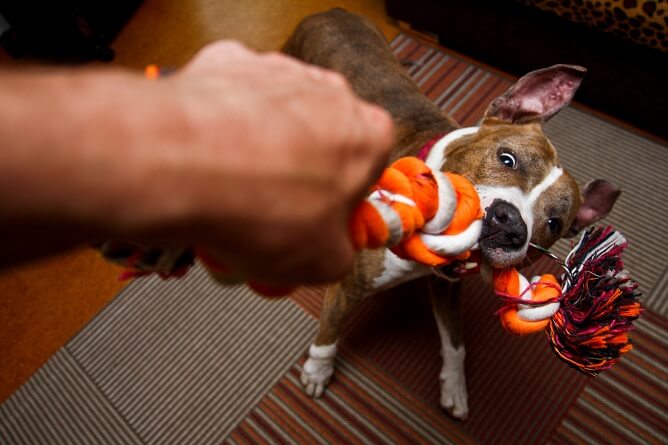
So, we have gone over all of the reasons why Pitbulls puppies bite but how can you stop this behavior?
Well, here we will be explaining just that! Here are four ways that you can stop your Pitbull puppy from biting.
Method 1: How to Stop Play Biting
The best way that you can stop your puppy from play biting is to show them that it is unacceptable behavior. I will break down how you can do this into a few simple steps.
Step1: Start Playing With Your Dog: The first thing that you will need to do is start playing with your dog. It is a good idea to have some chewable toys on hand. During this whole process, it is best to promote biting and chewing on these toys during play instead of your hands, clothes, etc
Step 2: When Your Dog Bites You, Let Them Know it Hurts: Next when your puppy eventually bites you, let them know that it hurts you. You can do this by squealing or by yelling “ouch!” in a high-pitched voice.
Step 3: Immediately Show Your Puppy a Toy to Bite Instead: Once you have established that your puppy’s bite has hurt you and have taken a short pause, offer your puppy one of its toys instead. Praise your puppy when they bite on the toy and continue playing.
Step 4: If Your Puppy Doesn’t Get the Hint, Stop Playing When He Bites: If your puppy keeps biting on your hands after this process, stop playing every time that they bite you. You can do this by standing up, crossing your arms, and avoiding eye contact for about 30 seconds. This will teach your puppy that when they bite you, playtime will stop.
Step 5: Keep Practicing: Puppies are not likely to learn how to stop play biting overnight, so practice makes perfect when it comes to teaching them this skill.
This is actually a good thing because it gives you an excuse to play with your adorable Pitbull puppy more often!
RELATED: The 10 Best Dog Toys for Pitbulls That Your Pittie Will Love
Method 2: How to Stop Resource Guarding Behavior
Unfortunately, training puppies not to resource guard tends to be trickier than teaching them not to play bite. Nevertheless, it can definitely be done! Here is how you can teach your Pitbull puppy not to resource guard.
Step 1: Teach Your Puppy That Resources Come From You: You can do this by feeding your puppy some food from your hand. Instead of feeding your puppy their dinner from their bowl, hand feed them their kibble. You can do this with toys as well. Call your puppy to you and reward them by giving them a fun toy.
Step 2: Do Not Take Things Away From Your Puppy Without Having Something Else: Puppies will often take things that they shouldn’t whether it is our shoes or one of our kid’s favorite stuffies. Though you should definitely take these things away from your puppy, it is always a good idea to have one of their toys to trade them with.
Doing this will both prevent and reduce resource guarding behavior over toys in puppies. Although this can sometimes feel like bribery, it is important to remember that puppies are still learning what items are toys and which ones are not.
Step 3: Normalize You Being Around Your Puppy When They Have Something: It is simply a fact that you are going to inevitably be around your dog when they have a toy or a treat. As a result, it is a good idea to normalize you’re being around them when your puppy has things that they like.
You can do this simply by sitting in the same room as your puppy when they are chewing on a chew toy or bone. It is best to sit at a distance at first and not acknowledge them in any way to minimize stress and potential conflict.
From there you can try walking by your puppy and rewarding them when they are not exhibiting guarding behavior through praise. This exercise is designed to slowly build up trust between you and your puppy.
It is important to remember that resource guarding can be quite serious and range in severity. Therefore, it is always best to seek further help from a qualified professional if your dog’s resource-guarding behavior is severe or if you do not feel comfortable working on this issue by yourself.
Method 3: Help Your Dog Through Their Fear and Anxiety
If a dog bites out of fear then working through these frightening emotions will also prevent the puppy from biting.
Considering that this issue can be quite complex and different in nature between different dogs, it is always best to seek help from a qualified animal professional when tackling defensive aggressive behavior.
Method 4: Supervise Play Between Your Puppy and Other Dogs
As we have mentioned previously, Pitbulls can have a higher tendency to dog aggression than some other breeds. This means that it is a good idea to monitor your Pitbull puppy when they are playing with other dogs and look out for signs of aggression.
Behaviors like staring, trying to get on top of other dogs, and overly rough biting and wrestling are all potential signs that play between dogs is getting out of hand. Whenever you believe that your puppy or the other dog is being too rough, then it is best to separate them in order to prevent a fight.
What to do if Your Pitbull Bites?
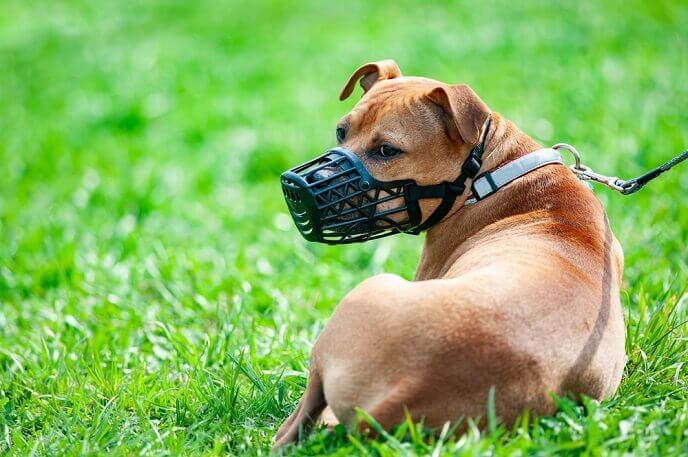
Dog bites can be an incredibly frightening situation for all parties involved. Here we will be explaining what you should do if your Pitbull bites a person or another animal.
Following these steps will help you to take control, de-escalate the situation, and prevent further damage.
Step 1: Take Control Over the Situation
The first thing that you should do is take control and separate your dog from the person or animal that they are biting.
If your dog has let go of them or has not made contact yet, you can separate them with an object. Large flat objects such as a trash can lid or clipboard tend to work best. However, in a pinch, even things like a broomstick or mop could work.
However, if the dog is locked on to someone the process is more trickier. It is best to start off by doing something to distract the dog such as blowing a whistle or air horn.
This may distract the dog for a second, allowing them to let go, where you can then quickly remove them. Physically removing a dog from a person or animal with your hands should be the last resort, as it is the least safe tactic. However, in some extreme cases, it may be necessary in order to protect the person or other animal.
Step 2: Assess the Damage
Once the dog and other party have been successfully separated, then you should assess the damage.
Pitbulls have strong jaws, which unfortunately means that a hard bite from an adult Pitbull could potentially be very severe. If the bite is extensive then you should immediately seek emergency hospitalization for humans or emergency veterinary care for other dogs.
Step 3: Decide How to Move Forward
From there you can decide how to move forward with the dog that has bitten. If a dog has severely bitten a person or another dog then training from a highly qualified professional is necessary when it is an option.
Unfortunately, in many countries dogs can be ordered to be euthanized when a severe bite case is taken to court, and their owners may also be subjected to jail time or a fine. Though laws regarding the euthanization of dangerous animals can vary by location and severity of the case, this ruling can occur if someone has died or received extensive damage from the bite.
This is why bite prevention and training are incredibly important, especially for Pitbulls due to the stigma that they already face.
What to do With a Pitbull That Bites Their Owner
If your Pitbull has bitten you aggressively then the decision is up to you when it comes to how you want to move forward.
Most owners will choose to either get help from a dog trainer or animal behaviorist that specializes in aggression cases or surrender the dog to a local shelter or rescue.
***
There you have it! Everything that you need to know about how to train your Pitbull puppy not to bite. Hopefully, this advice will make you feel empowered with controlling some of your adorable Pitbull puppy’s biting habits.
READ NEXT: The 6 Best Dog Foods for Pitbulls


